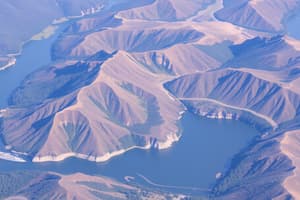Podcast
Questions and Answers
What do environmental geographers study in relation to coastal marshes?
What do environmental geographers study in relation to coastal marshes?
- Impact of climate change (correct)
- Potential oil drilling sites
- Marine biology research
- Archaeological sites
Which aspect is NOT typically explored by regional geographers?
Which aspect is NOT typically explored by regional geographers?
- Climate patterns
- Space exploration (correct)
- Landform development
- Human settlement patterns
How do geographical regions help us understand the world?
How do geographical regions help us understand the world?
- By revealing cultural identities (correct)
- By hiding historical events
- By preventing economic development
- By creating global barriers
What is a key focus of regional geographers?
What is a key focus of regional geographers?
How do environmental geography and geographical regions relate to each other?
How do environmental geography and geographical regions relate to each other?
What can studying geographical regions help us understand more effectively?
What can studying geographical regions help us understand more effectively?
What is the primary focus of environmental geography?
What is the primary focus of environmental geography?
Which tools do geographers in environmental geography commonly use?
Which tools do geographers in environmental geography commonly use?
In environmental geography, what are geographers examining when they study how environmental processes shape human societies and cultures?
In environmental geography, what are geographers examining when they study how environmental processes shape human societies and cultures?
Why is environmental geography relevant to understanding climate change?
Why is environmental geography relevant to understanding climate change?
What role do tools like GIS play in environmental geography?
What role do tools like GIS play in environmental geography?
How does environmental geography contribute to understanding natural hazards?
How does environmental geography contribute to understanding natural hazards?
Flashcards are hidden until you start studying
Study Notes
Exploring Environmental Geography and Geographical Regions
Geography is a multifaceted field that encompasses both physical and human geographic perspectives. By studying the relationships between people, places, and their environments, we gain insights into the complex dynamics of our planet. Let's dive deeper into two key subtopics: environmental geography and geographical regions.
Environmental Geography
Environmental geography focuses on the interactions between human societies and the natural environment. Geographers in this field explore the distribution and organization of natural resources and the impact of human activities on ecosystems and landscapes. They examine how environmental processes shape human societies and cultures, and how humans, in turn, shape their environment.
Environmental geography is particularly relevant to understanding issues such as climate change, biodiversity conservation, and natural hazards. Geographers employ a variety of tools and skills, including remote sensing, geographic information systems (GIS), and spatial analysis, to study environmental phenomena at different scales.
For example, GIS can be used to map the real-time spread of wildfires, enabling decision-makers to better anticipate and respond to these environmental hazards. Additionally, environmental geographers are studying the impact of climate change on coastal marshes, investigating potential carbon sequestration strategies in marine basins, and monitoring biodiversity with online digital data and AI.
Geographical Regions
Geographical regions are defined by their unique physical, environmental, and cultural characteristics. These regions help us understand how landscapes, climate, and human activities interact to shape the world around us.
Regional geographers explore a variety of themes, including landform development, climate patterns, and human settlement patterns. They also delve into the historical and cultural factors that have shaped regional identities and the ways in which regions have developed over time.
By studying geographical regions, we can gain insights into issues such as migration patterns, economic development, and global interconnectedness. For instance, geographers can examine how the distribution of capital cities and major urban centers is influenced by historical, cultural, and economic factors.
Conclusion
Environmental geography and geographical regions are two interrelated subtopics that provide valuable insights into the complex workings of our planet. By exploring these fields, geographers help us understand the dynamic interactions between people and their environments, and they offer practical solutions to the challenges facing humanity in the 21st century. Whether you're interested in environmental conservation, urban planning, or global interconnectedness, the study of geography offers a wealth of knowledge and perspectives that can enrich our lives and help us better understand the world around us.
Studying That Suits You
Use AI to generate personalized quizzes and flashcards to suit your learning preferences.




